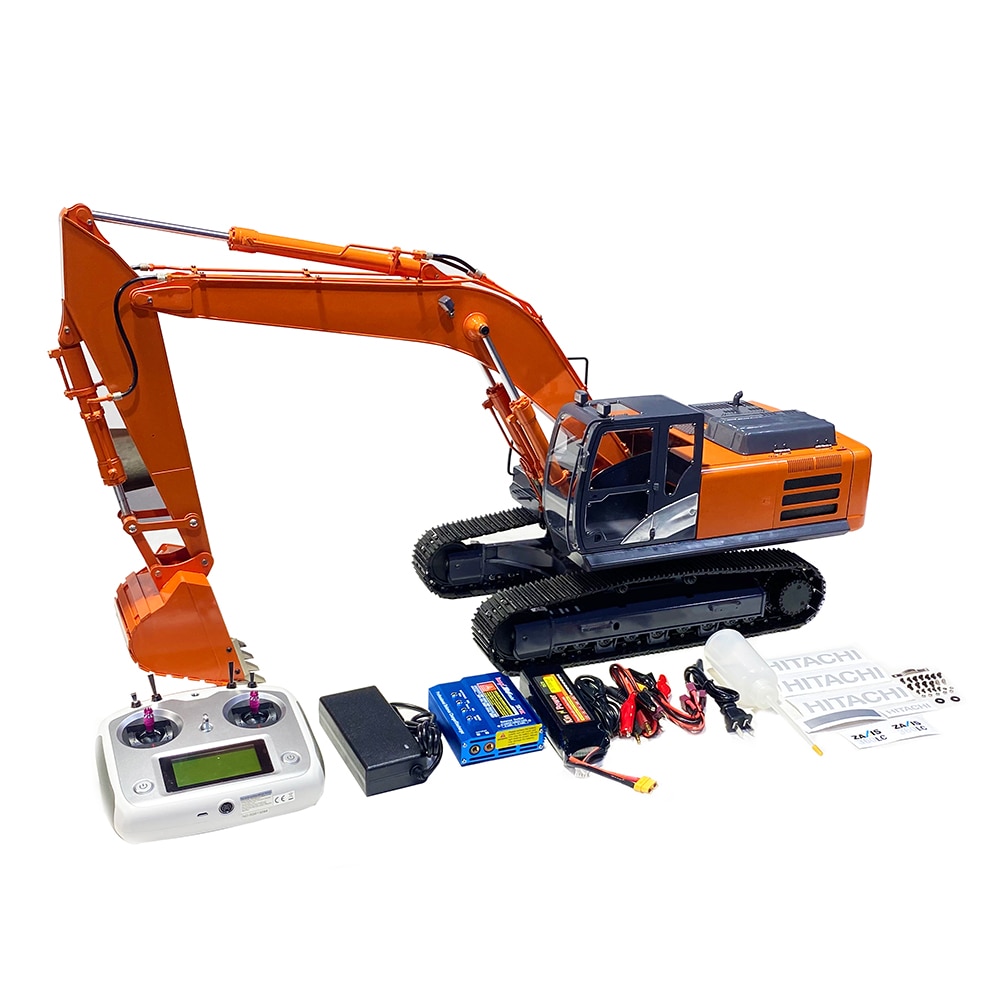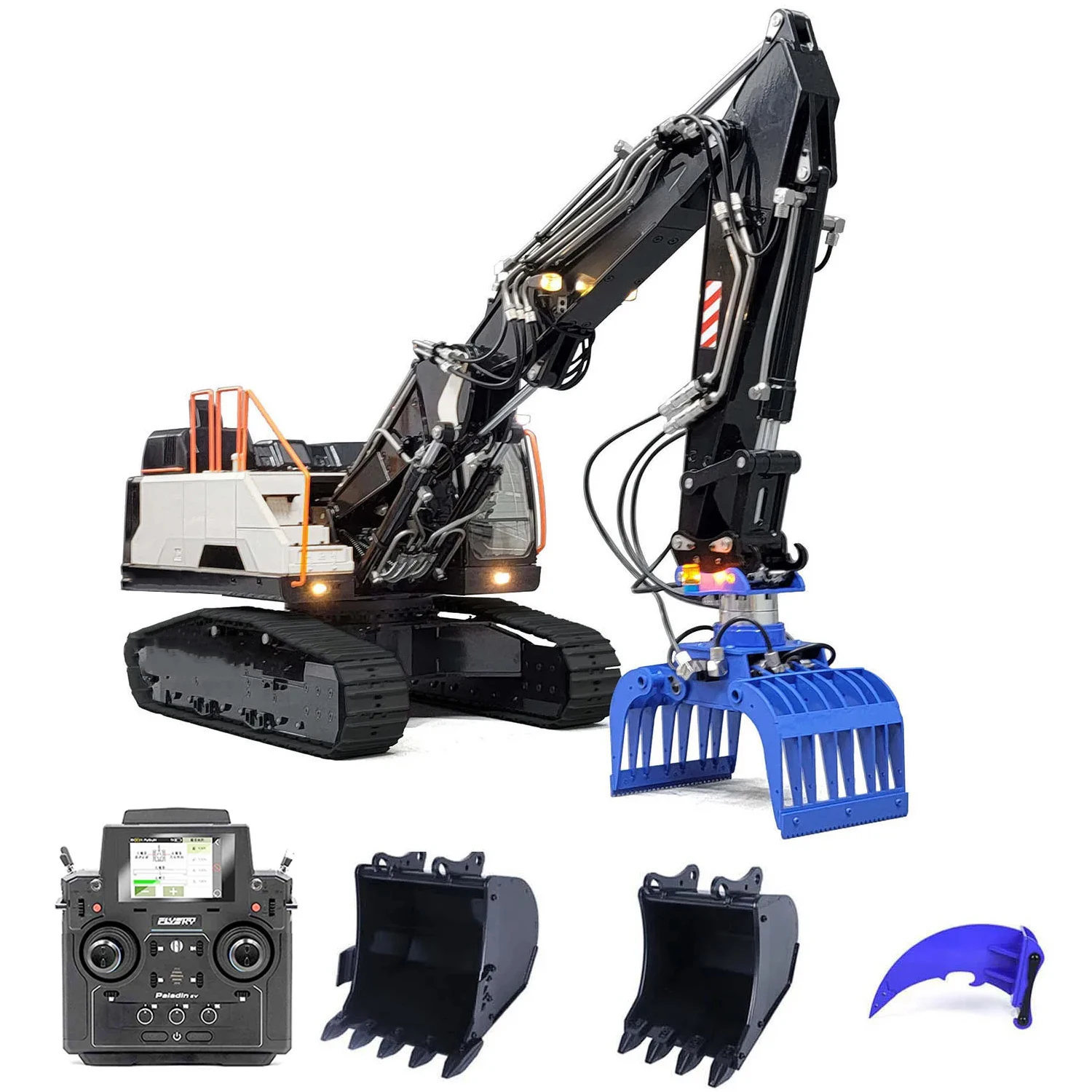10 Things to Consider Before Purchasing a remote control excavator for Your Company
Recognizing How Excavator Functions and Its Effect On Performance
Excavators play an essential role in construction and mining operations, counting on a complicated interaction of hydraulic and mechanical systems. Their capacity to execute a variety of tasks depends upon both their style and the innovation incorporated within. Comprehending these parts can considerably affect operational effectiveness and efficiency. As improvements remain to reshape the industry, one have to consider just how these modifications will influence future methods and performance.
The Fundamentals of Excavator Mechanics

The Role of Hydraulic Systems in Excavators
At the heart of excavator procedure lies the hydraulic system, which plays a critical role in powering the maker's functions and activities. This system makes use of pressurized hydraulic fluid to transfer power, allowing various activities such as digging, moving, and lifting. By taking advantage of the principles of hydraulics, excavators can perform tasks with remarkable accuracy and pressure, improving overall functional efficiency.The hydraulic system includes crucial parts, including valves, cylinders, and pumps, which collaborate to regulate the flow and instructions of the fluid. When the operator involves the controls, the hydraulic liquid is routed to details cyndrical tubes, converting the operator's commands right into physical movement. This system permits smooth and responsive actions, which are vital in construction and excavation settings. double e volvo rc excavator. The performance of the hydraulic system straight affects the efficiency and convenience of the excavator, making it a crucial element in contemporary excavation procedures
Secret Components of an Excavator
Comprehending the vital components of an excavator is crucial for grasping just how this powerful maker operates. An excavator contains numerous considerable components, including the undercarriage, home, boom, arm, and container. The undercarriage gives stability and movement, often including tracks or wheels to browse numerous terrains. Your home has the engine and hydraulic systems, permitting the driver to regulate activity and power the maker. The boom extends from the house, enabling upright reach, while the arm connects to the bucket, facilitating digging and lifting operations.Additionally, the cab houses the driver, equipped with controls for precise maneuvering. Each of these parts plays an essential duty in the excavator's overall capability, adding to its performance and performance on building and construction sites. Understanding these parts aids in maintaining and optimizing excavator performance, making certain jobs are finished securely and successfully.
Accessory Flexibility and Its Benefits
Add-on adaptability is a necessary facet of excavators, making it possible for operators to switch in between various tools tailored for particular jobs. This flexibility not just enhances job effectiveness yet likewise contributes to cost-effectiveness by minimizing the need for numerous machines. Understanding the different kinds of accessories readily available can substantially affect the general performance and performance of an excavator on job sites.
Kinds of Attachments
While excavators are mostly acknowledged for their excavating abilities, their true versatility hinges on the broad selection of add-ons readily available. These accessories boost the excavator's performance, permitting it to perform numerous tasks beyond excavation. Common attachments consist of containers (for digging and scooping), hydraulic thumbs (for grasping products), and augers (for drilling openings) Grapples are used for handling and moving particles, while rippers can separate difficult surface areas. Other specialized accessories, such as plates and plows, enable excavators to adapt to specific work needs. This diversity not only increases the machine's utility throughout various industries, including landscape design, construction, and demolition, yet likewise enables drivers to tailor their tools to meet specific task needs effectively.
Boosted Task Performance
Maximizing work performance is a key advantage of utilizing numerous excavator accessories. Various add-ons permit an excavator to execute numerous jobs without needing to switch devices, saving useful time and labor. For example, using a hydraulic hammer can damage concrete while a bucket add-on can dig deep into soil, allowing a smooth workflow. This convenience lowers downtime related to equipment adjustments and boosts productivity on-site. Furthermore, specialized accessories boost precision in tasks such as grading or landscape design, causing greater top quality outcomes. The capability to adapt to numerous job needs not only streamlines procedures yet additionally lessens the requirement for extra machinery, ensuring that jobs are completed promptly and effectively. On the whole, add-on adaptability considerably adds to enhanced job performance in excavation job.
Cost-Effectiveness and Versatility
Cost-effectiveness is a considerable advantage of making use of flexible excavator add-ons. These accessories enable a single excavator to perform several jobs, decreasing the requirement for extra equipment and labor - double e volvo rc excavator. By changing in between containers, hammers, and grapples, operators can tackle various jobs, from digging to demolition, thus making the most of equipment utilization. This flexibility not only reduces functional prices but additionally minimizes downtime connected with changing devices. Furthermore, the capacity to personalize excavators with specialized accessories enhances productivity, as they can effectively take care of diverse jobs according to job demands. To end, the mix of cost-effectiveness and convenience in excavator attachments adds to boosted functional effectiveness and resource allocation in building and excavation projects

Advanced Technology in Modern Excavators
Modern excavators are progressively furnished with innovative modern technology that changes excavation procedures. Automation streamlines operations, while enhanced fuel efficiency lowers functional expenses. Additionally, smart control systems improve accuracy and security, noting a considerable advancement in excavation tools.
Automation in Excavation Processes
As excavation technology evolves, automation has arised as a critical component in improving effectiveness and accuracy on work websites. Modern excavators are outfitted with sophisticated automated systems that assist in jobs such as grading, excavating, and trenching with marginal operator treatment. These systems utilize sensors, GPS, and artificial intelligence algorithms to guarantee accurate positioning and depth control, greatly lowering the margin for error. Furthermore, automation allows drivers to concentrate on calculated decision-making instead than manual controls, leading to improved efficiency overall. Such innovations not only enhance operations but also enhance safety and security by reducing human error in complex procedures. As a result, the assimilation of automation in excavation procedures represents a significant innovation in construction innovation, driving the sector towards higher effectiveness and effectiveness.
Improved Gas Performance
Developments in technology have also caused significant renovations in fuel efficiency for contemporary excavators. Modern makers are equipped with innovative engines that enhance power output while minimizing fuel intake. These engines make use of ingenious burning modern technologies, such as turbocharging and direct fuel shot, to improve efficiency and effectiveness. Furthermore, light-weight materials in construction lower overall weight, enabling much less power expense throughout procedure. The intro of variable rate controls allows operators to readjust engine efficiency according to certain tasks, even more minimizing gas usage. Therefore, these enhancements not only lower functional expenses however additionally contribute to ecological sustainability by decreasing discharges. On the whole, boosted fuel efficiency in excavators is a necessary advancement that reinforces efficiency and financial feasibility in the building and construction sector.
Smart Control Equipment
While drivers browse progressively complicated task sites, clever control systems in excavators have emerged as necessary tools for boosting efficiency and accuracy. These advanced technologies utilize sensors and algorithms to check various parameters such as tons weight, surface conditions, and operational performance. By immediately readjusting hydraulic features, clever systems optimize device efficiency, leading to enhanced efficiency and reduced endure components. Additionally, drivers take advantage of intuitive interfaces that provide real-time feedback and diagnostics, allowing for informed decision-making. This combination of technology not just streamlines operations however also reduces human error, contributing to safer work environments. As the building and construction sector proceeds to progress, smart control systems will certainly play an essential duty in forming the future of excavator effectiveness and effectiveness.
Enhancing Operational Effectiveness With Excavators
Excavators play a vital role in boosting functional efficiency across numerous construction and excavation projects. Their flexibility enables multiple tasks, including digging, training, and product handling, which enhances operations and minimizes the need for extra tools. With effective hydraulic systems, excavators can execute heavy-duty jobs with precision, significantly decreasing the time called for to complete tasks. The assimilation of sophisticated innovation, such as general practitioner and automated controls, further enhances their procedure, making it possible for operators to accomplish greater accuracy and reduce material waste. In addition, contemporary excavators are developed to take in much less gas and decrease discharges, adding to both price financial savings and ecological sustainability. By utilizing excavators properly, construction teams can enhance performance, meet task deadlines, and enhance overall site administration. This multifunctionality and performance make excavators important tools in the contemporary building landscape.
The Future of Excavators in Building And Construction and Mining Industries
As the building and construction and mining industries evolve, the future of excavators is poised for considerable change driven by technological advancement and altering operational demands. Advancements in automation and artificial knowledge are reshaping excavator capacities, enabling enhanced precision and effectiveness in procedures. Independent excavators are emerging, lowering the demand for human treatment and lessening the threat of accidents.Moreover, the assimilation of telematics and IoT modern technology allows real-time monitoring of maker performance and predictive upkeep, optimizing uptime. Environmentally friendly layouts, consisting of electric and hybrid designs, are getting traction, lining up with sustainability goals within the industry.Additionally, the use of sophisticated products and lighter designs enhances fuel performance while preserving performance standards. As these patterns progress, excavators will play a crucial duty in meeting the boosting demands for productivity and security in building and construction and mining, ultimately transforming operational landscapes.
Often Asked Concerns
How Do Climate Condition Affect Excavator Efficiency?

Weather significantly affect excavator performance, as rain and mud can hinder grip and stability, while severe temperatures might impact hydraulic systems. Operators should adapt to these variables to ensure optimal functionality and safety and security throughout operations.
What Safety And Security Steps Should Operators Adhere To While Utilizing Excavators?
Precaution for excavator drivers consist of using appropriate personal safety equipment, conducting pre-operation evaluations, guaranteeing appropriate communication with ground personnel, keeping a secure distance from overhead dangers, and sticking to well-known functional protocols to stop accidents.
Exactly How Commonly Should Excavators Be Preserved for Ideal Efficiency?
Excavators ought to be maintained frequently to ensure peak efficiency, typically every 250 operating hours or as specified by the maker. Routine checks boost reliability, protect against unanticipated failures, and expand the lifespan of the tools.
What Is the Ordinary Life Expectancy of an Excavator?
The ordinary life-span of an excavator typically varies from 10,000 to 15,000 hours of procedure. Aspects influencing long life include upkeep practices, running conditions, and the quality of rc excavator the maker itself, affecting general performance and effectiveness.

Can Excavators Run on Irregular Terrain Properly?
Excavators can run properly on unequal surface due to their verbalized layouts and flexible tracks. These features enable them to keep stability and traction, allowing effective procedure in difficult environments typically run into in building and construction and landscape design projects. Each of these components plays an important role in the excavator's total capability, adding to its effectiveness and effectiveness on building sites. Making best use of task effectiveness is a main advantage of using various excavator attachments. While drivers navigate progressively complicated work sites, clever control systems in excavators have arised as essential tools for enhancing efficiency and accuracy. Excavators play a necessary duty in boosting operational efficiency throughout numerous construction and excavation tasks. Breakthroughs in automation and artificial knowledge are reshaping excavator capacities, permitting for improved precision and efficiency in operations.